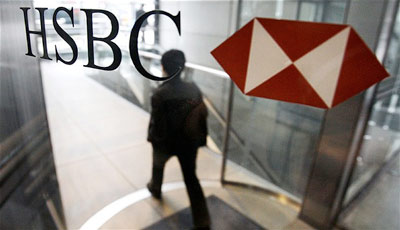Iranian Miniskirts, Bags of Cash Raise Doubts Over Controls at HSBC

Monitor finds lapses in bank’s efforts to prevent money laundering and evasion of sanctions following 2012 settlement with Justice Department
The monitor overseeing HSBC’s compliance with a landmark anti-money-laundering settlement has uncovered a range of potential lapses including loans to companies that exported miniskirts to Iran and candy to Syria, and the opening of an account by a man in Mexico who had thousands of dollars of cash in a bag, according to a person familiar with the monitor’s findings.
In 2012, HSBC Holdings PLC agreed to pay a then-record $1.9 billion to the U.S. Justice Department to settle allegations it failed to spot the laundered proceeds of drug trafficking in Mexico and failed to flag transactions with countries subject to economic sanctions, such as Iran. The monitor’s findings, which date from 2015, suggest that despite three years of efforts to bring compliance systems up to U.S. standards, HSBC still is struggling to meet the terms of the deal.
According to HSBC’s annual report released in February, the monitor found progress but expressed “significant concerns” about “instances of potential financial crime” and whether HSBC is on track to meet the settlement’s terms. The annual report didn’t include any details of lapses. In a few days, a summary of the monitor’s findings for 2015 will be filed in federal court, which also likely will be stripped of specifics.
HSBC’s 2012 agreement with the government included a five-year deferred-prosecution agreement and a demand that HSBC bring its compliance up to snuff and hire a monitor to check its efforts.
After that point, the Justice Department will decide whether the bank has fulfilled the terms or whether, instead, a prosecution of the bank should proceed. Another path for the Justice Department would be to extend the monitoring. Under the most severe scenario, its U.S. banking license could be at risk.
Stuart Levey, chief legal officer of the London-based bank, declined to comment about specific allegations but said the bank does continuously come across things that are problems. He said HSBC is determined to meet the settlement terms. “It’s as high a priority as anything in the bank, and we’re making the progress that we need to make,” he said. HSBC doesn’t believe it will end up being prosecuted after 2017, people familiar with the bank said.
The monitor, Michael Cherkasky, declined to comment, as did the Justice Department.
Mr. Cherkasky’s crew of investigators found some surprises as they delved into the bank’s world-wide business. Some of these surprises were in places where the bank faced problems before. They included Mexico, where ahead of the settlement U.S. authorities found that HSBC had allowed $881 million in drug-trafficking proceeds to flow into the U.S. In the settlement agreement, HSBC acknowledged that was true.
The person familiar with the monitor’s findings described several incidents, among them one where an HSBC branch in Sinaloa, a Mexican state that has experienced much drug-related violence, opened a private-wealth account for a 19-year-old man who arrived with a bag containing thousands of dollars in cash. The man described himself as a shrimp farmer.
Compliance officials who must decide whether a bank should open an account or extend a loan can face a tough job, having to make the call based on the movement of money through existing accounts or sketchy data such as local knowledge and material found online. Regulators want to see signs that compliance departments are at least flagging suspicious transactions and customers. That didn’t appear to happen in the Sinaloa matter.
A general regulatory demand is that banks understand their clients’ identities, expected activities and any money-laundering risks presented. “You’re supposed to know your customer and you’re also supposed to know your customer’s business,” said John Cassara,a former Treasury Department agent.
Investigators last year visited a site in Mexico where HSBC made a loan to finance construction of a factory. At the address, they found a mansion replete with servants, and no factory. Local HSBC staff members had made a site visit of their own but signed off on the loan.
The monitor’s investigators also found an HSBC client exporting Levi’s miniskirts from Brazil to Iran, a country that was under full U.S. sanctions at the time, not to mention banning such clothing in public. While the exports were a fraction of the bank customer’s business, HSBC should have flagged this trade for additional scrutiny but didn’t, the inspectors believed.
Another HSBC client exported candy from Brazil to Syria, also on the U.S. sanctions list. The inspectors thought this, too, should have been flagged.
Last year, a team of around 25 investigators working for Mr. Cherkasky made two visits to Brazil. There, they looked at HSBC’s business with a sugar and ethanol producer. One focus was a loan linked to sugar exports. It was funneled through a number of the company’s subsidiaries, including in places with reputations as tax havens, such as the British Virgin Islands, Curaçao and Aruba.
That meant the lending deserved extra scrutiny that it didn’t get, the inspectors concluded. They found HSBC hadn’t followed up to confirm the loan was used for what the bank had been told was the purpose. Basic questions weren’t being asked. The sugar company hasn’t been accused of any wrongdoing.
Last year, findings by the monitor of widespread compliance failings at HSBC Bank of Bermuda helped lead to the departure of the Bermuda bank’s chairman and its chief executive, people familiar with that situation said. The former chairman and the former CEO didn’t respond to requests for comment.
Mr. Levey, the chief legal officer at HSBC, said its ability to detect financial crimes has improved “dramatically” over three or four years. Last year, when HSBC had $13.52 billion in net profit, its programs to prevent financial crime cost $2.9 billion. It has nearly tripled its number of compliance officers, to around 9,000.
HSBC also has cut the number of countries where it does business by 17, in some cases because of financial-crime risk, according to people familiar with the bank. In places where it is staying, it has closed branches in riskier regions.
That includes Mexico, where Mr. Levey said the bank has shed millions of customers and closed dozens of branches, besides cutting off all cash transactions in dollars.
With operations in 71 countries, HSBC will continually face financial-crime risks it must guard against, Mr. Levey said: “It is a never-ending process, and frankly we’ll always find ways in which we’re slightly falling short.”
Source: WSJ





























